Hasan Khreisheh: Gaza Changed the World, the Resistance Prevailed, and a Silent Genocide Is Unfolding in the West Bank (Exclusive)

“What is happening in the West Bank is a silent genocide.”
Deputy Speaker of the Palestinian Legislative Council, Hasan Khreisheh, hailed the ceasefire and prisoner exchange agreement in Gaza as a “major victory for the entire Palestinian people,” achieved after the Israeli Occupation failed to meet its goals in the war of extermination.
In an interview with Al-Estiklal, Khreisheh, also a member of the Palestinian Legislative Council, highlighted Gaza's transformative impact on the world, noting that the full significance of this shift will unfold over time. He described the agreement as the pinnacle of what he termed the “miracle of the Palestinian people.”
Regarding the situation in the West Bank, the Palestinian politician explained that “what is happening in the West Bank is nothing less than a silent war of extermination, escalating daily through destruction, raids, and killings.”
“No one has the right to criticize any group resisting the occupation. Evaluating what has occurred since October 7 must be more profound, steering away from a superficial view of the conflict's nature.”
With unconditional American support, “Israel” has committed genocide in Gaza since October 7, 2023, leaving over 157,000 Palestinians killed or injured, most of them women and children, and more than 11,000 missing. The destruction, coupled with famine, has claimed the lives of dozens of children and the elderly, marking one of the world's worst humanitarian disasters.
Khreisheh, 69, is the Deputy Speaker of the Palestinian Legislative Council and previously served briefly as its Speaker. He is an independent political figure from the city of Tulkarm in the West Bank.
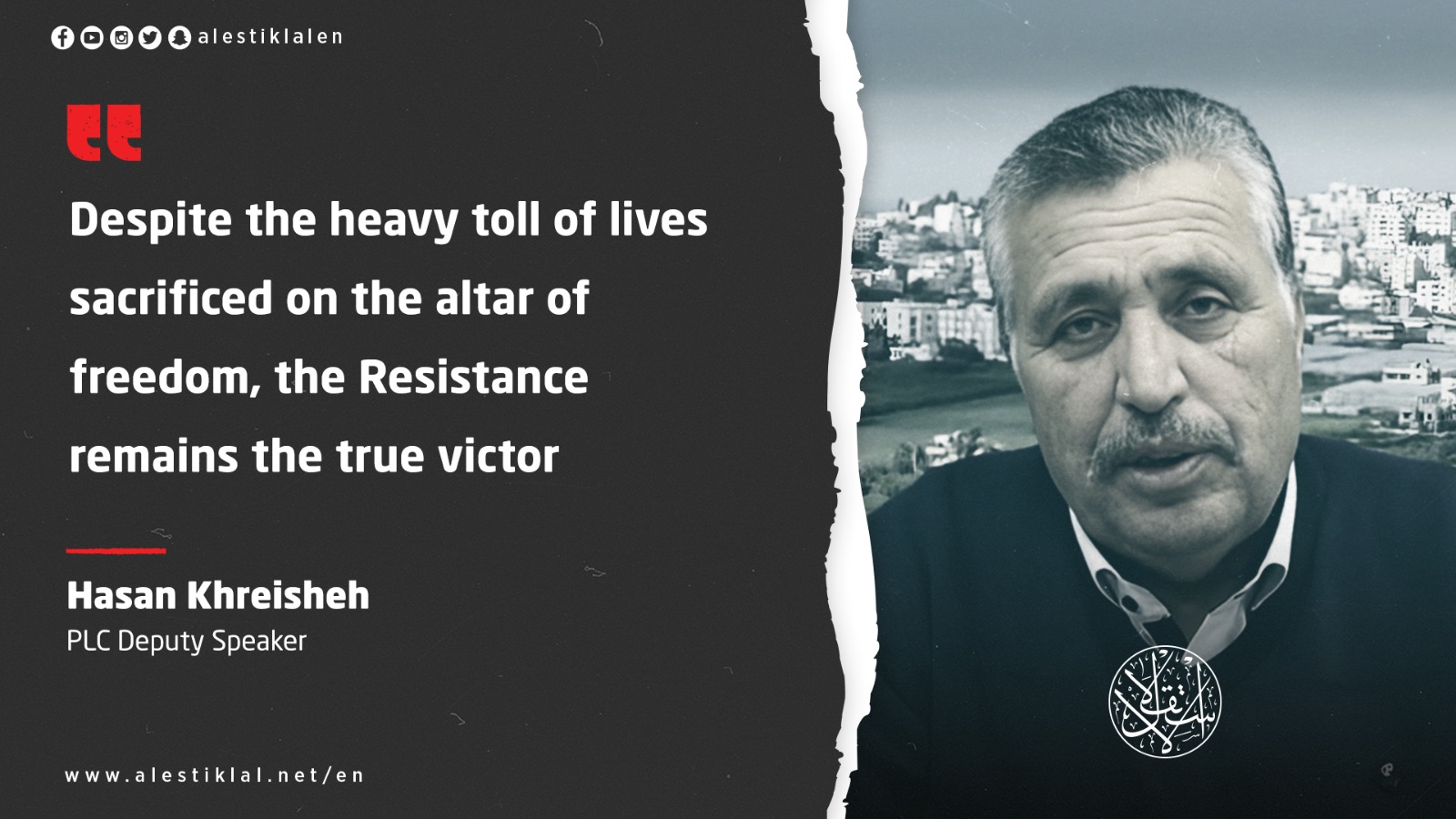
A Victory for the Palestinian People
What's Your Take on the New Ceasefire and Prisoner Swap Deal?
This agreement is a major victory for the entire Palestinian people. The Israeli Occupation was forced into it after failing to achieve the objectives it initiated the war for.
The agreement was originally a project crafted by outgoing U.S. President Joe Biden and his administration. At the time, Netanyahu rejected the deal, claiming he could achieve more. Yet today, he is compelled to accept it under pressure from the resistance’s strikes and the demands of the U.S. and Israel’s allies.
True success is achieving the goals. Israel has only succeeded in killing innocents and civilians and partially weakening the Resistance, but the end result says that this Resistance will remain; the agreement aligns more with the Resistance's demands than those of the Israeli Occupation.
Despite the heavy toll of lives sacrificed on the altar of freedom, the Resistance remains the true victor.
This is a moment to honor the spirits of the leaders and soldiers who gave their lives in this war, from the onset of Operation al-Aqsa Flood and beyond.
These events have changed the world, though the full impact of this change will only become apparent over time. The signing of this agreement is a testament to the ‘miracle of the Palestinian people.’
There are voices within the Palestinian Authority that frequently criticize managing the conflict through resistance. What is your perspective on this?
No one has the right to criticize any group resisting the occupation on behalf of the entire Palestinian people. Evaluating the developments since October 7 requires deeper insight, avoiding superficial views of the conflict.
Operation al-Aqsa Flood is widely supported by all, whether they are with or against Hamas. Some express public dissent, but their private views often differ for reasons of their own.
As for the path of resistance, it is undoubtedly the correct approach. Resisting an occupier is a fundamental principle of life. The Palestinian people have experienced U.S.-brokered negotiations, only to be manipulated and treated as weak. Resistance has proven otherwise, and the results speak for themselves.
Palestinian national struggle solidifies and preserves the Palestinian identity. Those who criticize the resistance are less concerned with the Palestinian identity and more focused on safety and achieving goals through the illusion of negotiations.
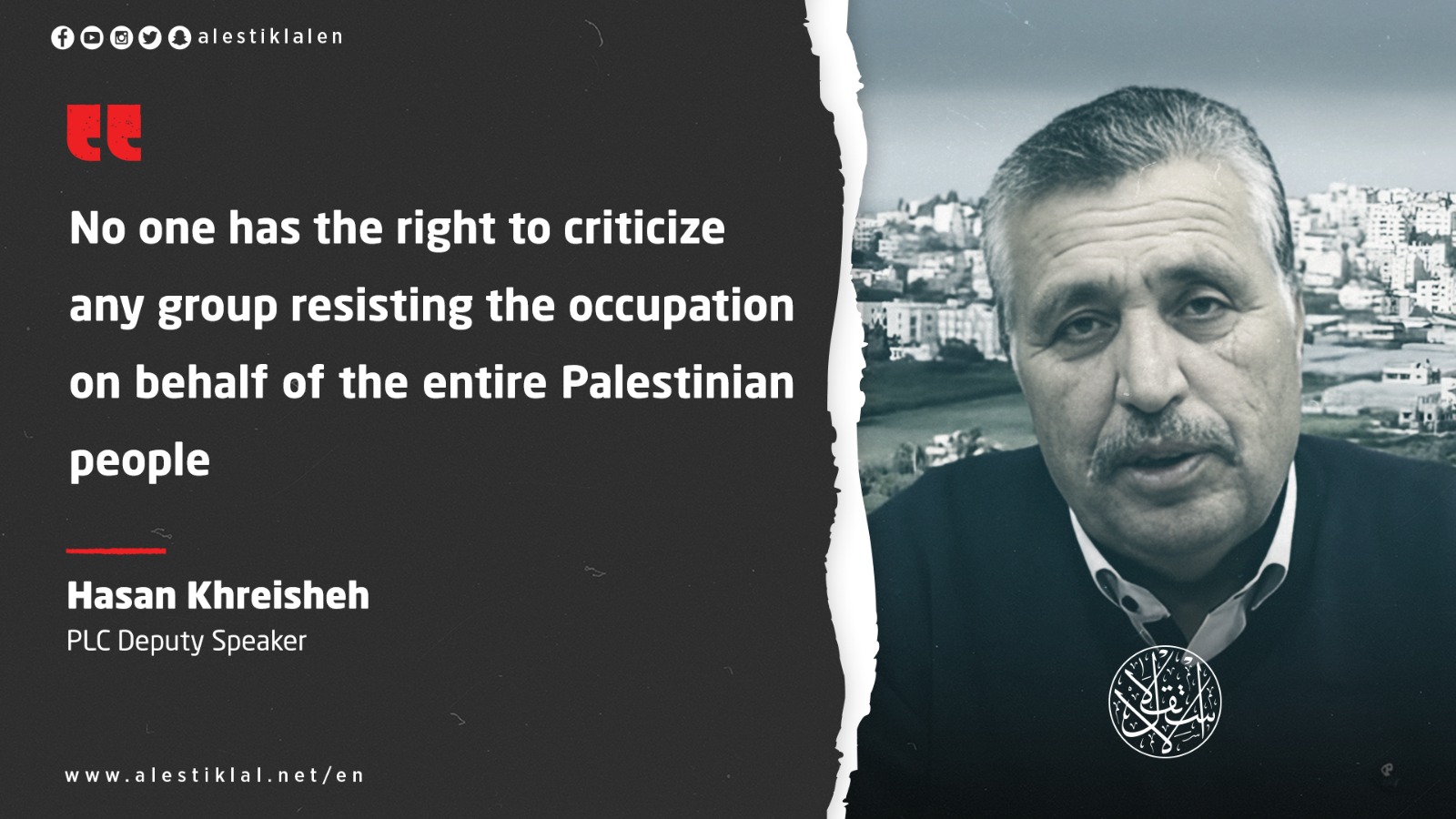
The Jenin Operation
How do you evaluate the recent confrontations in Jenin between Palestinian security forces and the Resistance? Why did the Authority reject all mediation efforts?
The situation in Jenin has sparked widespread anger among the Palestinian people.
Jenin holds a special symbolic place in the collective Palestinian memory, having shown remarkable resilience against the Israeli Occupation in 2002 and 2003, more so than even Baghdad during the same year. It was also the birthplace of the armed Intifada, initially known as the “New Fedayeen.”
These fighters have spread across Palestinian territories, deeply rooted in their struggle, and have gained strength, particularly after the events of October 7 and Operation al-Aqsa Flood. They have become an integral part of the resistance against the genocide targeting the Palestinian people, standing alongside their brethren in Gaza.
Despite years of relentless attempts, the Israeli Occupation has failed to eliminate this resistance. This failure has allowed the resistance to expand across the West Bank, particularly in northern refugee camps, where Israel seeks to render these areas uninhabitable, forcing residents to relocate.
The Israeli Occupation aims to disrupt the work of the United Nations Relief and Works Agency for Palestine Refugees [UNRWA] and plans to hinder any of its future activities.
What is your perspective on the Authority’s claim that it is ‘protecting the homeland’ through its confrontations with the Resistance in Jenin?
The Authority has rejected numerous mediation efforts to end the catastrophe in Jenin, instead promoting the notion that it seeks to protect the homeland.
Protect it from whom? From its own people and resisting youth? Such a stance aligns only with the mindset of silencing any voice or effort opposing the Israeli Occupation, under the pretext of agreements and commitments with the occupier.
We proposed initiatives to halt this internal bloodshed, including the ‘Wefaq Initiative,’ which was welcomed by the camp’s youth. However, the Authority has yet to respond positively.
This continued adoption of the “protecting the homeland” strategy against Palestinians contradicts the reality that true protection comes from resisting the occupation, not besieging the resistance.
In summary, the Palestinian Authority’s position conflicts with national interests, portraying resistance fighters as lawbreakers when they are, in fact, confronting the Israeli Occupation and its heinous acts, such as killings, home demolitions, and property destruction. The Authority’s actions fail to reflect the ground reality.
Israel’s assassinations in Jenin, whether through airstrikes or direct gunfire, have raised questions about the changing dynamics of confrontation. What is your take on this?
Northern West Bank camps, including Jenin, have become strategic targets for the Israeli Occupation. Jenin is particularly vulnerable, besieged by Palestinian security forces on one side and bombarded by Israel on the other.
The Authority must recognize that assassinations within the camp by the Israeli Occupation send a direct message to its leaders: Israel does not honor agreements or treaties. The Authority should not use these agreements as a pretext for targeting its own people.
We facilitated the delivery of a national agreement document to Jenin, which the Resistance accepted and we submitted to the Authority and President Abbas. However, we were soon stunned by reports of resistance fighters being assassinated in bombings.
I have consistently emphasized that Palestinians can overcome the Israeli Occupation, but they cannot afford to fight one another. I urge the Authority to reconcile with its resisting citizens and focus all efforts on confronting the Israeli Occupation.
From a media standpoint, how do you perceive the Authority's decision to close Al-Jazeera offices and ban related outlets? Does this reflect a weakness in its media strategy?
In terms of media, the Palestinian Authority’s unjustified actions against free press, particularly Al-Jazeera, reflect a concerning trend. Al-Jazeera has been part of the Palestinian people’s battle against Israeli Occupation.
While Israel closed Al-Jazeera’s offices in Jerusalem and Ramallah, the Palestinian Authority is now pursuing its reporters.
Such actions contradict national principles and enforce a blackout on the realities in Palestinian territories. How can a self-declared national authority mirror the practices of the occupier? This behavior is unjustifiable.
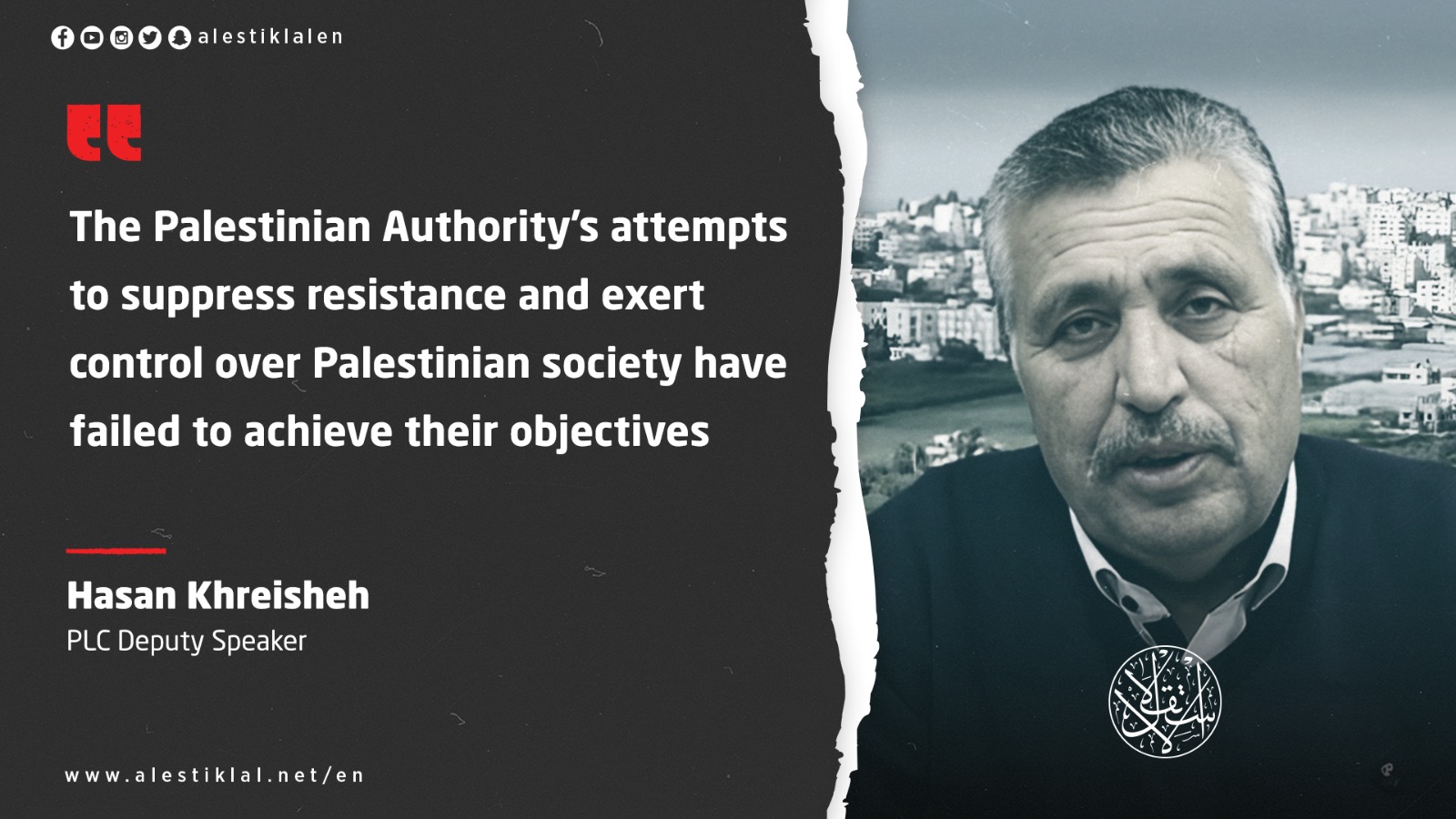
The Future of the West Bank
Recently, warnings about the potential collapse of the Palestinian Authority and its declining influence have become more frequent. Is this something that could actually happen?
The future of the Palestinian Authority is being manipulated to serve the interests of Israel and the United States. While Israel does not seek the Authority’s outright collapse, it aims to weaken it enough to ensure it continues fulfilling its functional role in advancing the Israeli Occupation’s goals.
This situation highlights the challenges faced by the Palestinian people, especially as progress on implementing the Palestinian National Council’s resolutions remains slow.
The Authority’s attempts to suppress resistance and exert control over Palestinian society have failed to achieve their objectives.
As part of the political elite, the Palestinian Authority has clung to the illusion of negotiations with Israel. However, these negotiations have produced no tangible outcomes since the agreements signed in 2003 and 2004.
Israel has consistently violated these agreements, expanding its occupation and building new settlements. Meanwhile, the Palestinian Authority has made no significant political progress.
In this context, the Authority remains in a weak position, facing substantial challenges in shaping Palestinian policy both domestically and internationally. If it seeks to place the Palestinian cause on the right track, the Authority must activate the national consensus represented by central and national committees. These bodies have repeatedly called for freezing the Oslo Accords, particularly after Israeli tanks trampled on most of their components.
The Authority should also abandon its reliance on the United States and Israel to achieve liberation. I’ve always emphasized that the U.S. has long sold illusions to the Palestinian Authority—a reality recognized by all except the Authority itself.
What is your opinion on President Abbas’s decision to appoint a deputy to assume his responsibilities in the event of a vacancy?
This decision arises amidst internal debates within the Authority about succession in the president’s absence. Traditionally, the Speaker of the Legislative Council would assume this role. However, with the Council now inactive, its responsibilities have shifted to the unelected National Council.
In this context, appointing a deputy is arguably the best of the bad options available, ensuring the position is not left vacant during emergencies. That said, this measure by President Abbas appears to have been taken under pressure to avoid internal discord within the Authority.
We hope that this step ultimately serves the broader interests of the Palestinian people and their cause.
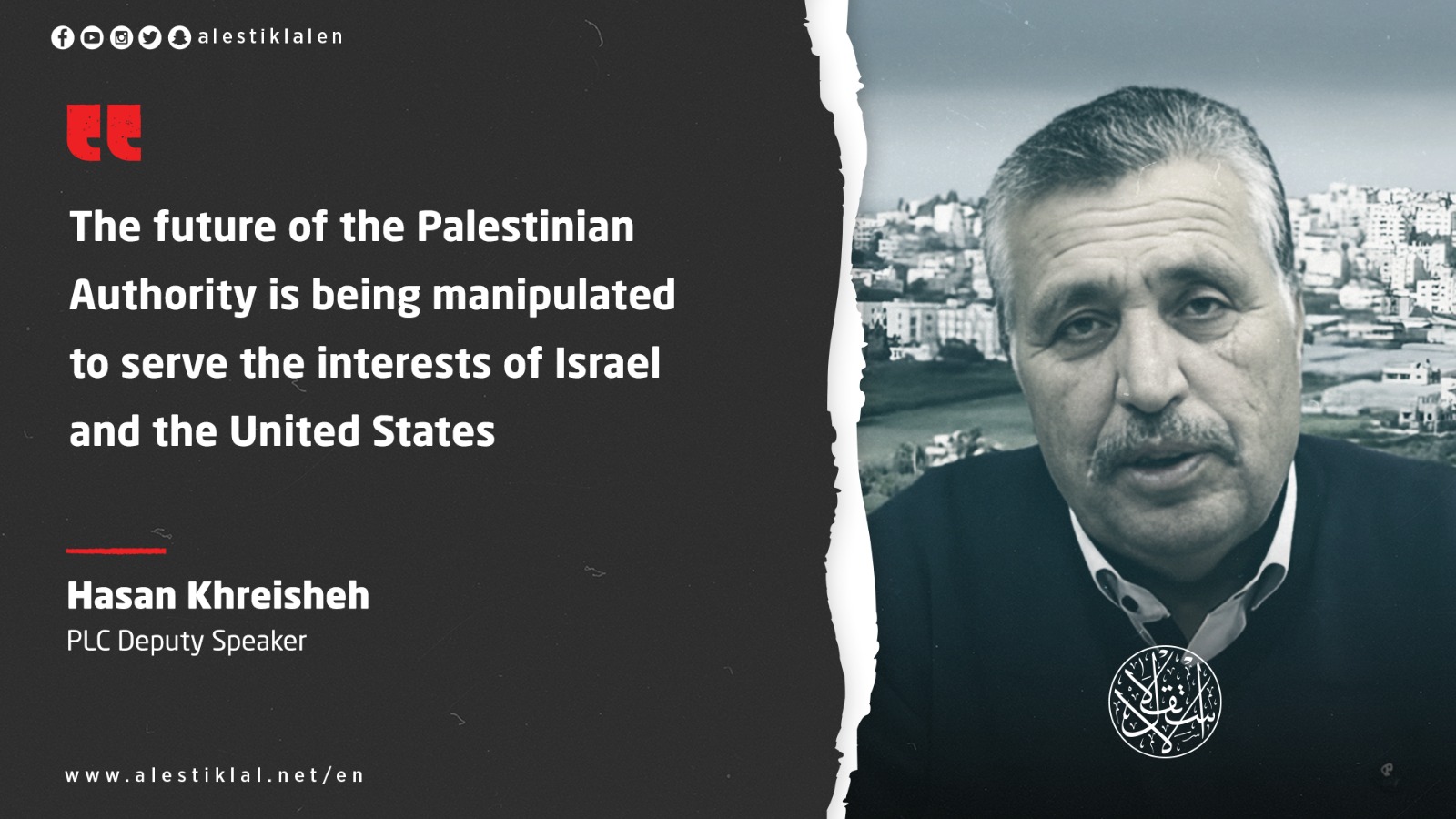
What’s your reaction to the Palestinian Authority handing over the individual behind the stabbing attack in Dayr Qadis? Would it have been better for the Authority to refrain from taking such action?
Following this heroic resistance operation, which broke the Israeli security dominance in the area, the Israelis felt provoked. Their leadership responded with threats to destabilize the fragile security in the West Bank, particularly targeting areas like Jenin that have shown strong resistance against the Israeli Occupation.
What is happening in the West Bank is a silent genocide, escalating daily through destruction, raids, and killings.
Regrettably, the Palestinian Authority has increasingly become part of the official Arab system that neglects the Palestinian cause. The act of surrendering resistance fighters to the Israeli Occupation is a blatant manifestation of this neglect, reflecting a functional role that violates Palestinian and even basic human norms.
One might argue that agreements with Israel justify such actions. Yet the Israeli Occupation has long trampled these agreements, blatantly and explicitly violating them. Why does the Authority cling to these accords to the extent of surrendering its own people who resist?
This behavior serves neither the Authority nor the Palestinian people. If the Authority believes such actions will secure its rule or stabilize its position, it is only deceiving itself.
The discussion of the Authority’s role naturally extends to the broader stance of Arab states on the Palestinian cause. Over various summits, Arab countries have abandoned the Palestinian cause, withdrawing meaningful support for both the people and the Authority itself.
This abandonment is also reflected in the failure of international institutions, such as the United Nations and the Security Council, to intervene and halt the violence and aggression against Palestinians.
In this context, the Palestinian Authority has shown that it is not part of the Palestinian people’s struggle against the occupation. Instead, it has become part of a system that weakens the Palestinian cause.
The ongoing war against the Palestinian people, especially in Gaza, highlights the moral and humanitarian decline within the international community. Institutions like the United Nations and the Security Council have failed to take meaningful action to cease hostilities or provide real protection for the Palestinian people. This underscores their abject failure to address the Palestinian issue effectively.
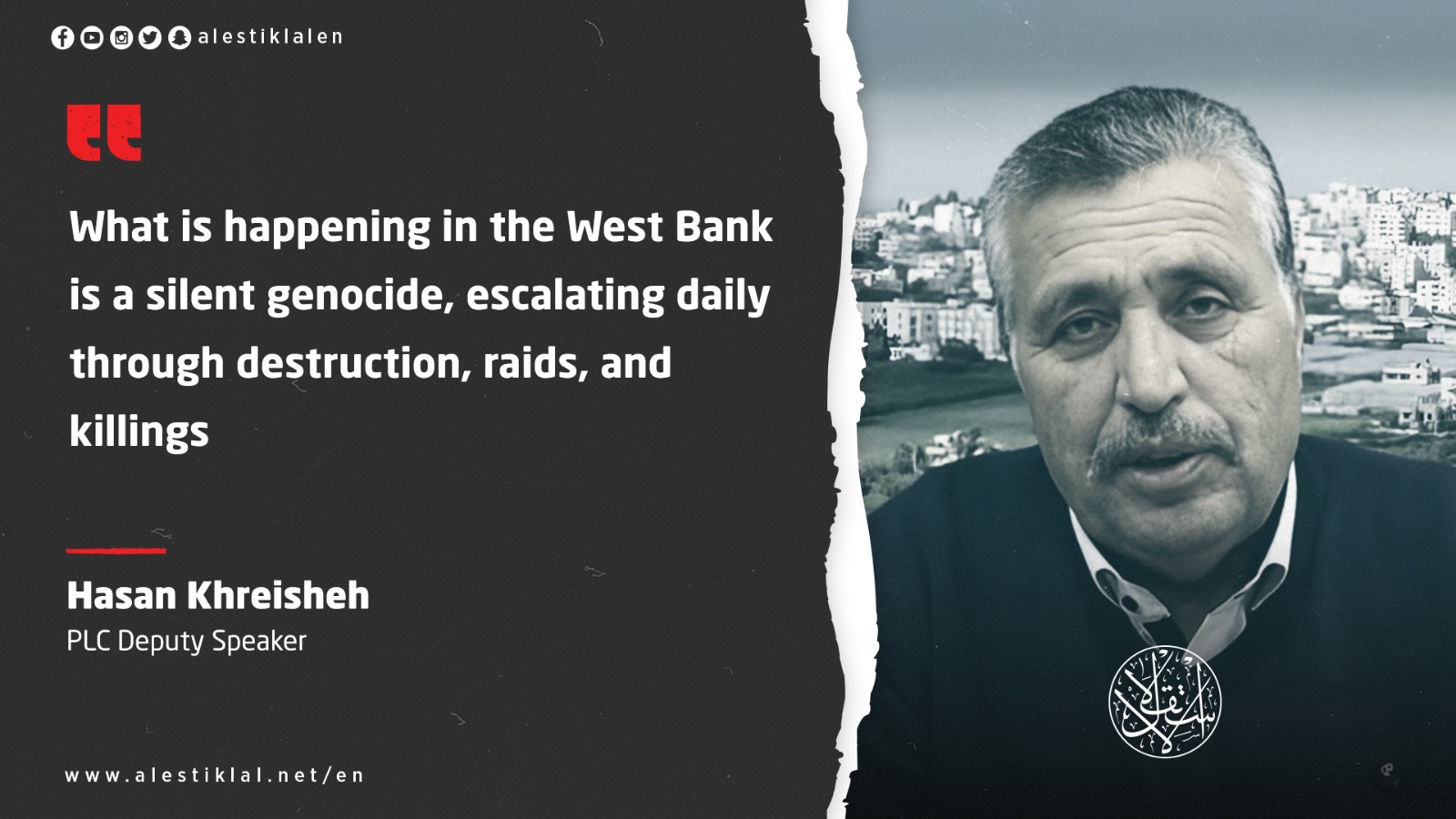
Ongoing Challenges
How do you evaluate the performance of the new Palestinian government since its formation? Is there a real change, or is it merely a change of faces?
The new Palestinian government was formed amid significant and peculiar contradictions. While key Palestinian figures convened in Moscow to address internal division, President Mahmoud Abbas announced the formation of a new government led by someone from the Palestinian Investment Fund.
Given these circumstances, it is unlikely that the new government will bring about meaningful change or enact transformative policies.
In the current climate, the government must reflect the will and aspirations of the people and work towards genuine national unity. Unfortunately, what has occurred is merely a reshuffling of faces without any substantial shift in policies or direction. Those who truly seek the people's welfare should form a government chosen by the people. Regrettably, the people and the authorities seem to be on entirely different paths.
Recently, complaints about food shortages have emerged in the West Bank, fueling debates on Israel waging a war of starvation. What solutions do you think the government should adopt in response?
The Palestinian Authority is experiencing a severe economic decline, particularly with the sharp drop in salaries.
Many workers and employees receive only 70% of their salaries, an amount barely sufficient to meet basic needs. There is a deliberate effort by the Israeli Occupation to impoverish the Palestinian population. This includes targeting Palestinian banks under the watch of the Authority, further exacerbating the economic strain.
The revocation or denial of work permits for Palestinian laborers in Israel compounds the crisis. The issue is not merely a lack of goods but rather the lack of financial resources to purchase them.
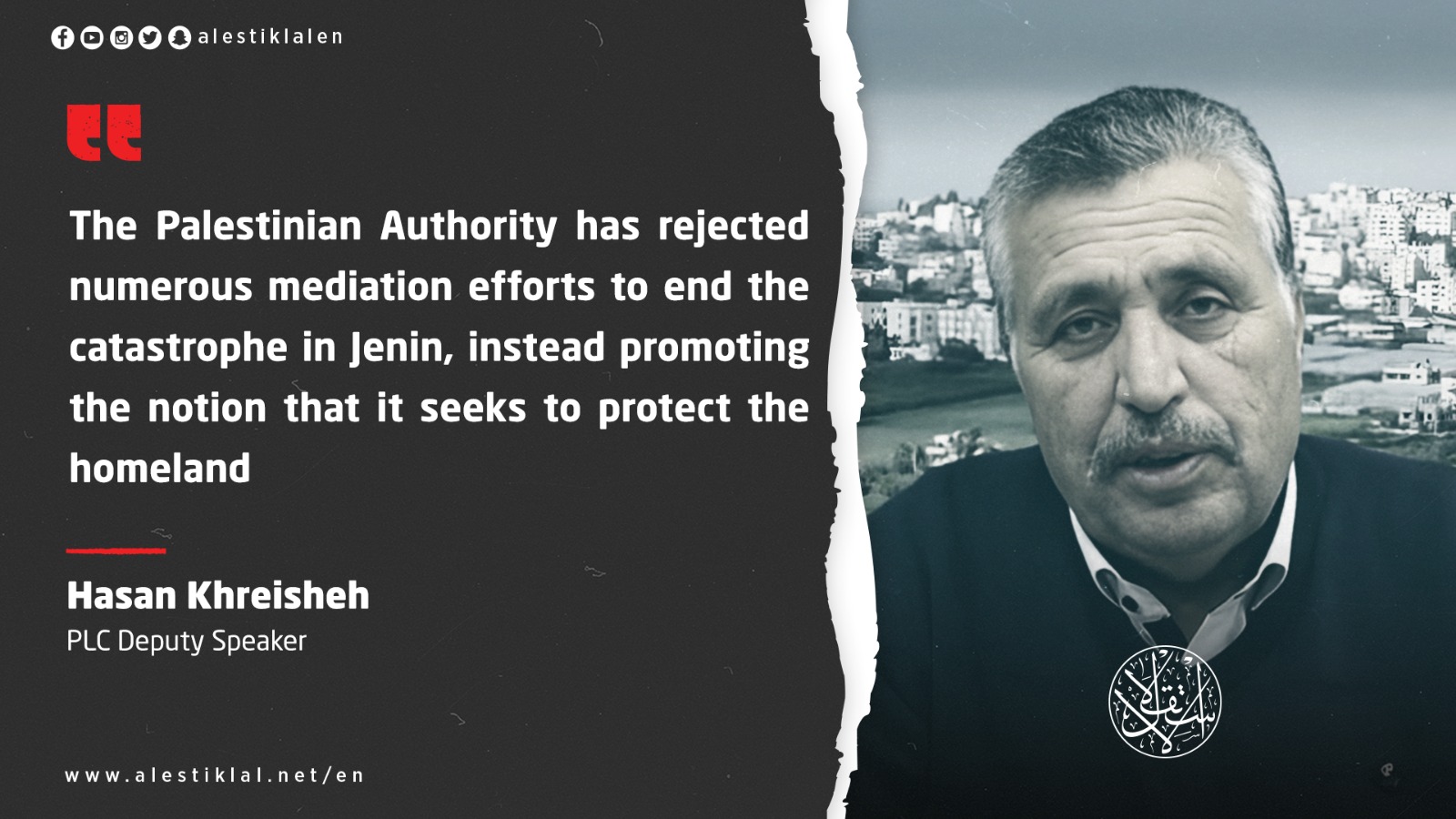
Smotrich’s Statement on Treating Jenin and Nablus Like Jabalia: What Encourages Such Remarks, and What Is Your Opinion?
Indeed, Jenin and Nablus represent significant strongholds of resistance for the Israeli Occupation, comparable to Jabalia in terms of their capabilities.
Jenin and Nablus are home to heroes who genuinely trouble Israel. The suggestion to treat them like Jabalia is not merely rhetoric—it is already being implemented.
A silent war of extermination is ongoing in the West Bank, intensifying daily through destruction, incursions, killings, and drone strikes. These actions have already begun.
What emboldens such statements is the occupier's position of power [Israel], coupled with the Palestinian people's vulnerability due to weak stances from their authority, the Arab states, and the international community.
What Has Stalled Palestinian Reconciliation for Years?
The Palestinian Authority frequently portrays itself as ready for reconciliation, holding numerous meetings with factions in various countries. However, the reality on the ground tells a different story.
Media squabbles suddenly flare up, fueling division instead of fostering unity. It appears certain parties benefit from the ongoing rift and have little interest in true reconciliation.
This division ultimately serves only the Israeli Occupation. Those obstructing reconciliation, knowingly or not, are aligning with Israel’s interests.
Reconciliation remains stalled because resisting the Israeli Occupation is no longer the sole priority. Some parties now have conflicting agendas that undermine both the interests of the Palestinian people and the prospect of reconciliation.











